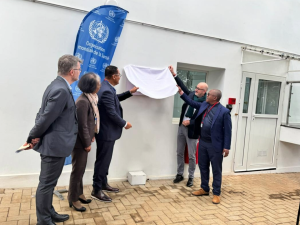In the capital city, Antananarivo, a modern laboratory certified by the World Health Organization (WHO) was inaugurated today at the renowned Institut Pasteur. This facility not only marks significant progress for the country but is also emerging as a key pillar for polio surveillance in Eastern and Southern Africa. Since it began operating in 2023, the laboratory has played a vital role in detecting more than 40 cases of polio recorded between 2022 and 2024. Its ability to quickly identify the presence of the virus allowed health authorities to respond with timely and large-scale vaccination campaigns. The results are promising: in May 2025, Madagascar celebrated two consecutive years without any new confirmed cases. After a thorough evaluation process, the outbreak was officially declared over.
“The establishment of this laboratory is a concrete demonstration of our unwavering commitment to protect the children of Madagascar and the entire region,” said Dr. Nely Alphonse José, representative of the Ministry of Health. “It places us in a strategic position to detect any threat quickly and respond effectively.”
Rwanda combines youth innovation and circular economy to build a resilient nation
Beyond Madagascar’s borders, the WHO has recognized the importance of this facility for neighboring countries. “With this advanced technology, Madagascar is well positioned to become a regional leader in the fight against polio,” said Dr. Laurent Musango, WHO Representative in Madagascar. “The laboratory will serve as a shared resource that strengthens surveillance and outbreak response throughout the region.”
One of the lab’s core innovations is the use of Nanopore sequencing technology. This cutting-edge tool enables the virus to be identified within hours, eliminating the need to send samples abroad and wait days for results. The accelerated turnaround enhances decision-making and enables swift public health responses.
The laboratory was made possible thanks to technical and financial support from the WHO and the Bill & Melinda Gates Foundation. It is equipped with state-of-the-art tools and staffed by highly trained professionals capable of identifying various virus strains and monitoring environmental signals that could indicate the presence of the disease.
For Madagascar, the center marks a turning point. In addition to strengthening national response capacity, it brings the country closer to the global goal of eradicating polio once and for all. “We are now better prepared to face any future outbreak and protect our population,” Dr. Nely Alphonse José added.
The opening of this high-tech facility represents a milestone that brings renewed hope not only to Madagascar, but to the entire African continent — where the fight against preventable diseases remains a pressing priority. With tools like this and a strong commitment, the dream of a polio-free world is closer than ever.









